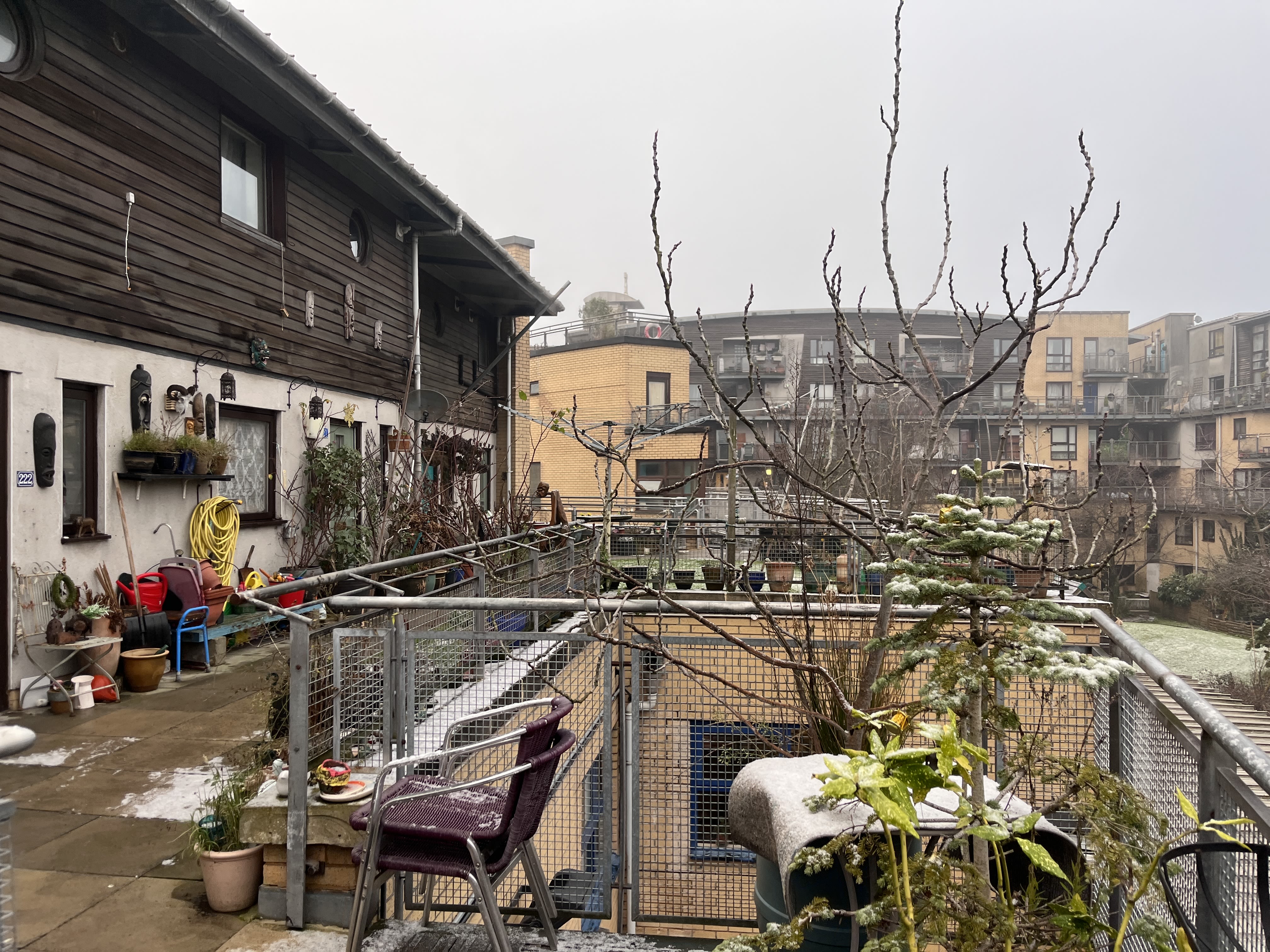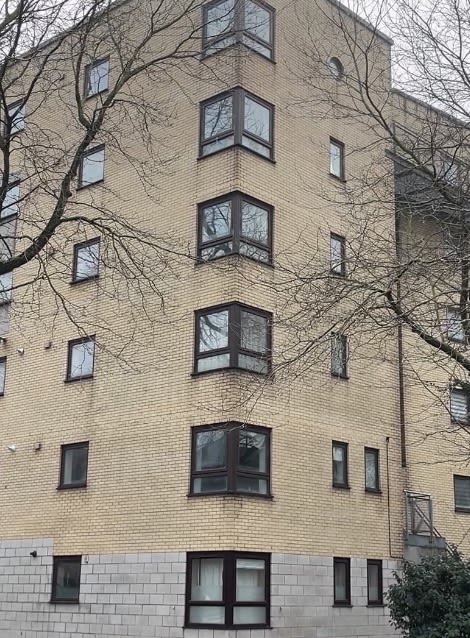‘Our housing co-op is powered by the spirit of punk rock’ - the renters taking control of their housing
Across Greater Manchester, young and old generations are turning to housing co-operatives as private rents spiral out of control. Can co-ops offer a solution?

In 1984, Hulme Crescents were in such bad condition that the council simply stopped charging rent.
This towering concrete council estate just south of Manchester city centre was supposed to be the answer to post-war slum clearance - but structural faults, accidental deaths and a high crime rate drove them into disrepair.
With families fleeing and tenants left with no rent to pay, the concrete jungle became a haven for squatters, ravers and anarchists.
Ex-resident John Phillips fondly recalls the Crescents as “party central”, a place that the police wouldn’t go near unless they had at least four vans full of officers.
With their horseshoe shape, interconnected walkways, and cheap plasterboard walls that were often knocked through to make space for all-night raves, the Crescents became an experiment in communal living.
Now they are long demolished, but the positive aspects of their spirit lives on as Homes for Change, one of Manchester’s largest purpose-built housing co-operatives and home to around 100 residents.
Those who were once squatters are now tenants. They’ve swapped the crazy raves for civilised committee meetings. And while they now have rent to pay, resident John Phillips says they’re still living for “cheap as chips”.
An aerial of the old Hulme Crescents, on the ceiling at Kim's Kitchen bar underneath Homes for Change. Image by Serena Murphy
An aerial of the old Hulme Crescents, on the ceiling at Kim's Kitchen bar underneath Homes for Change. Image by Serena Murphy
With the cost of rent skyrocketing, could they offer a solution for thousands of others?
It’s not just Homes for Change residents who think so. This style of living might also provide an alternative for the elderly and those living with disabilities, one which gives them more independence and control.
But, while many people have heard of them, not many actually know what a housing co-op is.
Do you know what a housing co-op is? 🏠
— Serena Murphy (@serena_murphy) January 20, 2025
Housing co-ops are usually formed by members collectively buying a property, with each resident paying monthly for bills and maintenance, as both tenant and landlord.
So, with no profit-seeking individual in control, they can offer a cheaper alternative to extortionate private rents – a problem which is ever growing in Manchester.
Outside Homes for Change. Image by Serena Murphy
Outside Homes for Change. Image by Serena Murphy
Recent data from the Office for National Statistics (ONS) shows Manchester’s private rent prices have soared in the past four years, with inflation rates higher than both the north west and England as a whole.
Private rents in Manchester rose to an average of £1,279 a month in November 2024, an annual increase of 11.4% compared to figures in November 2023.
Last October, Trafford made headlines as one of the UK’s top 20 ‘least affordable’ places to rent, with private renters spending just over 40% of their annual household income on rent.
Those looking for a one-bedroom property in Trafford could expect to pay £893 a month, almost £600 more than those living in Homes for Change.
Once a Hulme Crescents raver, John Phillips now sits on the committee at Homes for Change.
He has been involved with the Hulme co-op, as he proudly says, since it was nothing but a “lump of plasticine”.
“What powered [Homes for Change] on was the spirit of punk rock,” he said. “It was the idea that there’s nothing going for us so we’re going to do it ourselves.”
For John, the affordability of living in a co-op remains one of the major benefits.
“It’s cheap as chips because there are no paid workers so there’s no service charge whatsoever,” he explained. “What you pay is the registered social rent and on top of that we have one big communal water rate which gets divided by the number of bedrooms in each flat.”
He pays around £400 a month for rent.

John has lived in Homes for Change for almost 30 years now. But he remains acutely aware of the UK’s housing crisis.
“I think the availability of decently priced housing is terrible,” he said. “It’s worse than it’s ever been.
“But I think out of that [rent crisis], people will club together and manage to organise themselves and buy up an old building for next to nothing.”
'The availability of decently priced housing is terrible. It's worse than it's ever been'
Blase Lambert, CEO of the Confederation of Co-operative Housing (CCH), which supports co-operative housing organisations and strengthens their partnerships with the government, has been in the housing co-op sector for almost 28 years.
He feels that recently, there has been an increase in demand for this form of living.
“For pretty much the first 20 years, people weren’t trying to set up co-ops,” he said.
“But in the last seven to eight years, we’ve seen an increasing pace of people coming to us and saying, ‘We want to set one up’.
“People are moving away from a sense of unaffordable individual ownership to a more mutually supportive shared ownership model.”
But being part of a housing co-op isn’t just beneficial for young people struggling to get on the property ladder. The sense of community – and of course the affordability – are attracting older people and those with disabilities.
For them, it can provide a way to retain their independence.
“There is a hell of a lot of support for people living [in Homes for Change] who would find it much more difficult if they were living out there in the big bad world,” said John. “Those who are elderly and vulnerable, who have disabilities or health issues.”
Mr Lambert has also seen a rise in older people opting to live their later life in a housing co-op.
“[Older people] don’t necessarily just want to move into a standard market-driven retirement village where they’re offered very little choice in terms of control over their homes and their lives,” he said.
“I’ve been to a number of schemes where the first thing people are told is, ‘We play bingo on a Thursday, and we’ve got a panic alarm in every room’. There will be people who need these things, but is that the limit we can offer people when they get to 65 or 70?
“So, we’re seeing both ends of the age range pushing the increase in demand for co-operative solutions to their housing situations.”

Two such people in the process of setting up an accessible co-op are friends Kai D’Argenta and Sian Ingham.
After seeing first-hand the unique struggles that people with disabilities face when trying to find housing which is both affordable and accessible, they decided to set up Citrus, a housing co-op specifically designed for those living with disabilities.
For Kai and Sian, living in a housing co-op with other people with disabilities could allow them to spend more money on vital support for Citrus members.
“Because the rent is going to be much less predatory [than in private rentals] in terms of expense, this means there will actually be a bigger budget for personal assistants,” said Sian.
“I think one of the issues with private renting or with privatised group care homes,” said Kai, “is that if you're obliged to make a profit, you're also obliged to discount some of the money that would have gone into the actual care provision.
“But with Citrus, any money that we make is being put straight back into maintaining the buildings and making sure that the residents are taken care of.”
As well as navigating a private housing market that is not geared towards providing affordable accessible housing, the pair noted that most housing co-ops are also physically inaccessible for disabled people.
“There is often a very literal DIY approach to housing co-ops,” said Kai. “There are cooking rotas, cleaning rotas, and you’re expected to help with repairs.
"There are lots of good elements to that approach, but it often tends to mean that people with various disabilities find them either very difficult or impossible to join.
“So, we’re trying to prioritise finding buildings that are as physically accessible as possible.”
Sian. Image by Abigail Staniforth
Sian. Image by Abigail Staniforth
Sian. Image by Abigail Staniforth
Sian. Image by Abigail Staniforth
Kai and their dog Cube. Image taken by themself
Kai and their dog Cube. Image taken by themself
But the pair are finding it hard to get the support they need to create Citrus.
“There are very few banks that will do mortgages for co-ops,” said Kai.
“We found a fantastic place in Salford, and it fell through because all the banks we tried were no longer loaning to co-ops.
“I think the housing market is very geared towards private individuals or big corporations - and it doesn’t have to be.”
However, the pair have seen growing support from more established housing co-ops, raising £40,000 from their support alone.
With this help, they hope to set up their first Manchester house as soon as possible.
“We’ve been told for a long time that [owning your own home] is what success looks like,” said Dr Clark. “When it comes to housing, you buy your own home and get on the property ladder. That’s now out of reach for so many people. So, people have to think, ‘What alternatives do I have?’”
And housing co-ops might just be the answer.






